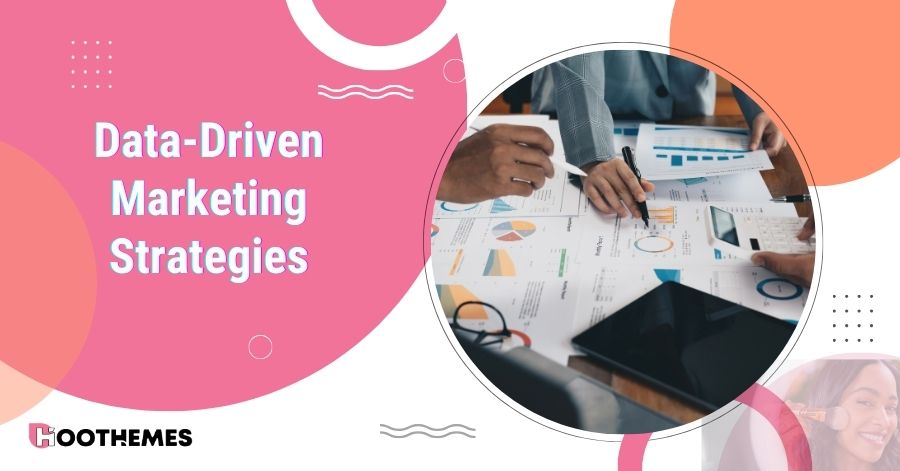Do you ever wonder how the world’s leading brands seem to know exactly what their customers want? The secret lies in data-driven marketing strategies — the smart move of leveraging analytics to carry out top-notch marketing campaigns.
But before you begin to worry, you don’t need to be a data scientist to thrash this out. So, let’s dive in and explore how you can implement an effective digital marketing strategy and make data-driven decisions!
The Role of Analytics in Marketing
Analytics is the backbone of successful marketing strategies. Think of it as your secret weapon for uncovering customer preferences, buying patterns, and overall behavior. The role of analytics is to convert raw data into actionable insights, getting to know your target audience on a deeper level than ever before.
Comprehensive data use can give you a competitive edge and help you achieve more success with your marketing plan, from prescriptive to predictive analytics.
Essential Components of Data-Driven Marketing Strategies
Embarking on a data-driven marketing journey requires a solid understanding of its key elements. If you want to leverage data to your advantage, here are the three major components you should focus on while crafting a data-driven marketing strategy:
● Data collection: This is all about gathering those valuable pieces of information about your clients. Quantitative and qualitative information about your audience can be obtained through customer surveys or Google Analytics.
● Data analysis: Once you have your data, what’s next? This is where data analysis comes into play — translating numbers and facts into a coherent picture of your customer base.
● Data integration: Managing data from numerous sources can be challenging; thus, a unified data approach is crucial. Your CRM and marketing automation tools come in handy here.
Ensuring effective data collection, analysis, and integration will set a strong foundation for your data-driven marketing journey. These components can reshape your strategic decisions, helping you craft more impactful and successful marketing strategies that resonate with your audience.
Top Data-Driven Marketing Strategies
Armed with your data and insights, it’s time to implement them. Here are some top data-driven marketing strategies that may prove useful to you:
- Personalization: Adapt your offers and marketing messaging to each unique customer’s tastes and actions.
- Customer segmentation: Group your clients based on shared characteristics and personalize the experience further.
- Predictive analytics: Use historical data patterns to forecast future behaviors.
- A/B testing: Test multiple iterations of a webpage or advertisement to see which version your audience responds to the best.
Remember, it’s not about using every strategy listed but picking the most sense for your situation. Always focus on improving customer experience and adding value to your audience.
Leveraging Analytics to Optimize Campaign Performance
Think of analytics as the compass guiding your marketing, helping you at various stages of your campaigns:
● Pre-campaign: Before initiating the campaign, thoroughly examine your dataset to derive insights about your customers’ preferences, behavior, and past responses. For example, social media insights can be used to garner information like age, gender, location, and interests, which would considerably influence the direction of your campaigns.
● In-campaign: Once the campaign is live, ongoing analytics are essential to monitor its progress. Track key metrics — click-through rates, bounce rates, conversions — which provide information about campaign effectiveness and necessary adjustments. Assign more resources to the elements demonstrating higher performance.
● Post-campaign: After the campaign’s conclusion, analyze its efficiency to gain insights for future initiatives. Various tools like Google Analytics, Adobe Analytics, or Mixpanel can provide a detailed overview of the completed campaign. Comprehensive data on significant metrics like customer acquisition cost, return on investment, conversion rates, and customer lifetime value can be acquired.
Using analytics empowers you to develop an iterative approach where every campaign becomes a learning opportunity, helping you refine strategies and create improved marketing efforts.
Challenges and Limitations of Data-Driven Marketing
Addressing potential challenges in data-driven marketing, particularly legal and ethical considerations, is integral to maintaining consumer trust and privacy. It is imperative to responsibly handle consumer data and ensure that your methods comply with applicable laws and regulations.
To ensure you meet these compliance requirements and avoid potential legal complications, utilizing templates for legal documents can be highly beneficial. Platforms like Lawrina provide a wide range of templates to assist in creating your unique legal document structure.
Particularly useful is their free 7-day trial, where you can generate unlimited templates, aiding you in establishing a solid legal framework for your data-driven marketing initiatives.
By establishing proper legal structures from the beginning, you secure your business’s integrity and your customers’ trust, which is an invaluable asset in today’s digital age.
Conclusion
The strategic application of data-driven marketing strategies and analytics can positively influence the outcome of your campaigns. With a strong base of verifiable data, you can access several potential benefits, such as improved customer engagement, increased returns on investment, and enhanced market efficiency. Remember that a comprehensive understanding of your consumers is a critical starting point for every successful campaign, and data analytics is an optimal tool for gaining these insights.
It’s essential to note that you don’t need extensive expertise in analytics to apply data-driven marketing strategies — being an interested marketer dedicated to utilizing data insights is enough. Therefore, it’s advantageous to familiarize yourself with essential metrics, ensure your data systems are in place, and prepare yourself to execute an effective campaign.
FAQs
1. What Exactly Is Data-Driven Marketing?
Data-driven marketing is an approach where marketers use insights derived from analyzing large volumes of data to make strategic decisions about targeting, messaging, and campaign optimization. It involves leveraging data to understand customer behavior, preferences, and trends to create more personalized and effective marketing strategies.
2. How Can Data-Driven Marketing Strategies Benefit Businesses?
Data-driven marketing strategies can provide several benefits to businesses, including improved customer engagement, increased ROI, enhanced targeting and segmentation, better understanding of customer needs, and the ability to measure and optimize marketing efforts more effectively.









